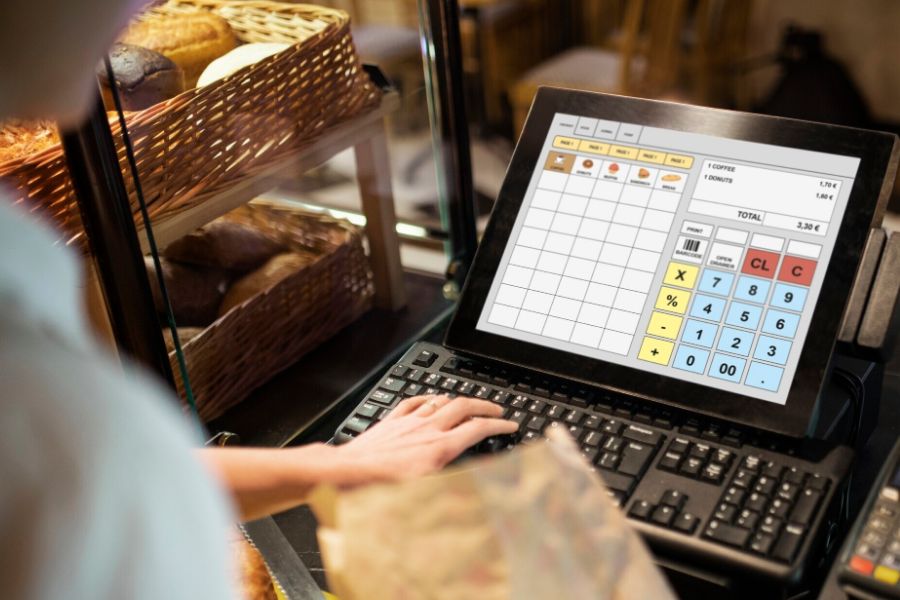In today’s dynamic business environment, the adoption of all-in-one Point of Sale (POS) systems is gaining momentum in the UK. This article will dissect these comprehensive POS solutions’ components and associated costs. By shedding light on the intricate details, we aim to provide businesses with a clearer understanding of the features, benefits, and considerations involved in implementing all in one POS systems, enhancing their operational efficiency and customer experiences.
Unveiling the All-in-One POS Solution
All in one POS systems have emerged as holistic solutions that amalgamate various aspects of business operations. They integrate functionalities such as payment processing, inventory management, order tracking, and customer engagement under a unified platform, streamlining operations and improving overall management.
Incorporating an all-in-one POS solution also has a positive impact on staff productivity and customer interactions. By providing a centralized platform, employees can efficiently manage transactions, track orders, and access customer information without the hassle of switching between different tools.
Components of an All-in-One POS System
- Touchscreen Terminal: The central element of an all-in-one POS system is the touchscreen terminal. This user-friendly interface serves as the command center for various operations, allowing employees to process transactions, manage inventory, and access customer information.
- Payment Processing: All-in-one POS systems include built-in payment processing capabilities. This feature enables businesses to accept various payment methods, such as credit and debit cards, digital wallets, and mobile payments.
- Inventory Management: A crucial component, inventory management tools within an all-in-one POS system enable businesses to track stock levels, monitor product availability, and automate restocking processes. This helps prevent stockouts and overstock situations.
- Order Tracking: All-in-one POS systems facilitate efficient order tracking from initiation to fulfillment. This ensures smooth order processing, reduces errors, and enhances customer satisfaction.
- Employee Management: Some all-in-one POS systems include employee management features, enabling businesses to track staff activities, manage shifts, and monitor performance.
- Security Features: Security is paramount in POSAll-in-one solutions incorporate encryption, user access controls, and compliance with industry standards to safeguard sensitive customer and transaction data.
- Customer Display: Many all-in-one POS systems include customer-facing displays that enhance transparency during transactions, allowing customers to verify their purchases and even sign digitally.
- Integration Capabilities: All-in-one POS systems often offer integration with third-party tools such as accounting software, marketing platforms, and inventory optimization tools.
- Customer Relationship Management (CRM): Integrating CRM functionalities, all-in-one POS systems allow businesses to store customer data, purchase history, and preferences. This data assists in creating personalized experiences and targeted marketing campaigns.
- E-commerce Integration: For businesses with online operations, e-commerce integration is crucial. All-in-one POS systems can seamlessly synchronize online and offline sales data, ensuring consistency across all channels.
The Cost Factors of All-in-One POS Systems
- Software Expenses:
Licensing fees for the POS software
Subscription costs for additional features or updates
- Installation and Setup:
Costs associated with deploying the system
Integration with existing systems and databases
- Customization and Configuration:
Expenses for tailoring the POS system to specific business needs
Configuration of menu items, pricing, and discounts
- Training and Support:
Costs for training staff to use the new system
Fees for ongoing technical support and troubleshooting
- Data Migration:
Expenses related to transferring existing data to the new system
Ensuring data integrity and accuracy during migration
- Maintenance and Upgrades:
Costs for system maintenance, updates, and patches
Potential fees for future software upgrades or feature enhancements
- Payment Processing Fees:
Transaction charges associated with processing credit card and digital payments
Integration with payment gateways or processors
- Additional Hardware and Accessories:
Costs for replacement or expansion of hardware components over time
Accessories like stands, mounts, or protective cases
- Hidden Costs:
Unforeseen expenses like network upgrades or compatibility issues
Costs related to downtime during system implementation or troubleshooting
Making the Decision: Is All-in-One POS Right for Your Business?
When considering the implementation of an all in one POS system for your business, making the appropriate decision can require careful consideration. Firstly, you need to examine the composition and features of the system to determine if they adequately reflect your business needs and operations. Compatibility with your existing systems is also a crucial factor.
Advantages of All-in-One POS Systems
- Enhanced Efficiency: All-in-one POS systems integrate various operations such as payment processing, inventory management, and customer engagement, streamlining workflows and reducing manual tasks.
- Unified Data Management: With an integrated system, data is centralized, allowing for real-time updates and accurate insights across different departments and locations.
- Improved Customer Experience: All-in-one POS systems enable quicker transactions, personalized service, and efficient order tracking, leading to higher customer satisfaction.
- Simplified Training: Training staff becomes easier with a single platform, reducing the learning curve and ensuring consistent processes.
- Cost Savings: By eliminating the need for multiple software solutions and manual processes, businesses can save on software subscription costs and reduce operational inefficiencies.
- Scalability: All-in-one POS systems can accommodate business growth, from single-location stores to multi-location franchises, ensuring consistent operations.
- Integration with E-commerce: Many all-in-one POS systems in the UK offer integration with online platforms, enabling businesses to manage both offline and online sales seamlessly.
- ConnectPOS Integration: The integration of ConnectPOS with various eCommerce platforms and payment gateways further enhances inventory management, sales data synchronization, and customer engagement, providing a comprehensive solution for UK businesses.
Considerations Before Implementation
- Compatibility with Existing Systems:
Ensure the chosen all-in-one POS system seamlessly integrates with your current software, hardware, and infrastructure.
Check for compatibility with accounting software, e-commerce platforms, and other tools you use.
- Scalability and Future Growth:
Evaluate if the chosen system can accommodate your business’s growth trajectory.
Consider its ability to handle increased transaction volumes, additional locations, and expanding product ranges.
- Customization and Flexibility:
Assess whether the all-in-one POS system allows customization to suit your specific business needs.
Look for flexibility in configuring product categories, pricing structures, and customer loyalty programs.
Conclusion
All-in-one POS systems represent a comprehensive solution for modern businesses in the UK. By integrating various functions and simplifying operations, these systems offer the potential to improve efficiency and customer experiences. If you’re interested in exploring the benefits and features of all-in-one POS systems, you can reach out to contact us for more information. Their expertise in the field can help guide your decision-making process.
►►► See our products: Magento POS, BigCommerce POS, Shopify POS, Woocommerce POS, NetSuite POS, Commercetools POS, Custom POS, White label POS, Customer Experience Solution and Next-Gen POS




